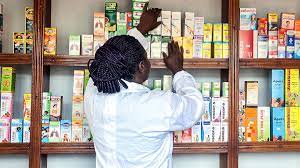Health
Association urges FG to Include Pharmacists in all Society Health Activities

The National Chairman, Association of Community Pharmacists of Nigeria (ACPN), Dr Adewale Oladigbolu has urged the Federal Government to include pharmacists in all healthcare activities in the country.
Oladigbolu made the call at the opening of the 41st Annual National Scientific Conference of ACPN on Tuesday in Lagos.
Newsmen report that the theme of the conference is: ‘Never Waste A Crisis: Community Pharmacists, Learning For Future Preparedness’.
He said the pharmacists could be included as primary healthcare providers in the National Health Insurance Scheme and by signing the new Pharmacy Bill.
“This will go a long way to engender healthier nation.
Community Pharmacists in Nigeria are equipped with great skills and are doing a lot in their space.“And we are ready to work to make Nigeria a more beautiful nation,” he said.
He explained that COVID-19 vaccination in Community Pharmacies had been approved via a Memorandum of Partnership (MOP) with the National Primary Healthcare Development Agency (NPHCDA).
According to him, the association now have a National Working Committee in place to see to the closure of routine immunisation gaps, by securing approval for community pharmacists as providers.
The President, Pharmaceutical Society of Nigeria (PSN), Prof. Cyril Usifoh, said that the conference provided opportunities for stock taking and strategic planning for the future preparedness.
Usifoh said preparedness entailed that community pharmacists and other pharmacists in other practice areas, acquired appropriate skills and expertise to be able to offer care services that would save lives in future.
“According to International Pharmaceutical Federation (FIP), COVID-19 pandemic really exposed gaps in our public healthcare delivery systems globally.
“Pharmacy has been one of the essential resources deployed to address most of the noted gaps in the fight against the pandemic.
“What needed to be examined critically is whether health systems especially in Nigeria is making the most use of what pharmacists can offer.”
The Executive Director, NPHCDA, Dr Faisal Shuaibu, urged the pharmacists to live up to the mandates given to them by their integration into the primary healthcare delivery system in Nigeria.
Shuaibu, also a keynote speaker at the event, said the conference availed pharmacists and participants the opportunity not only to deliberate and exchange views, but to learn.
He added that the conference provided participants the opportunity to learn, unlearn and relearn to equip themselves with contemporary mechanisms in the management of health crisis and surviving through it.
“This is not only a retrospective call to community pharmacists, but also an introspective call to Nigeria Healthcare stakeholders and policymakers, to rethink and rejig the Nigeria healthcare system in readiness for future health crisis.
“Unfortunately, the recent global pandemic has amplified our voices and made the hesitancy in some quarters a mist that will fade with time,” he said.
The conference featured exhibition for pharmacists and pharmaceutical companies to display their services and products.
(NAN)
Health
Millions of Children Experience Daily Domestic Violence in Schools, Homes Globally – WHO
Hundreds of millions of children and adolescents around the world face daily violence in their homes, schools, and elsewhere which could have lifelong consequences.The World Health Organisation (WHO) said this on Thursday.The violence includes being hit by family members, being bullied at school, as well as physical, emotional, and sexual violence, WHO said.
In most cases, violence occurs behind closed doors. More than half of those aged two to 17 or more than a billion minors in total experience violence each year according to the WHO. In three out of five children and adolescents, it is physical violence at home, with one in five girls and one in seven boys experiencing sexual violence.Between a quarter and half of minors are affected by bullying according to the information provided.Only half of the children reportedly talk about their experiences of violence and less than 10 per cent receive help.Lifelong consequences could include depression and anxiety disorders, or tobacco and drug use.As a result, many children do not reach their learning potential in school.Against the backdrop of being highly preventable, violence remains a horrific day-to-day reality for millions of children around the world leaving scars that span generations,” said Tedros Adhanom Ghebreyesus, WHO director general.The UN’s first conference on violence against children opened in Bogota, Columbia on Thursday.At the two-day conference, more than 100 countries pledged to find ways to better support overwhelmed parents and introduce school programmes against bullying and for healthy social behaviour.They also pledged to raise the minimum age for marriage.Some countries wish to generally ban children from being hit at school or home. (dpa/NAN)Health
WHO Identifies 17 Pathogens as Top Priorities for new Vaccine Development

The World Health Organisation (WHO) has listed 17 bacteria, viruses and parasites that regularly cause disease as top priorities for new vaccine development.WHO, in a study published on Tuesday, reconfirmed long-standing priorities for vaccine research and development (R&D), including for HIV, malaria, and tuberculosis – three diseases that collectively take nearly 2.
5 million lives yearly. The study is the first global effort to systematically prioritise endemic pathogens based on their regional and global health impact. Attention is also given to pathogens such as Group A streptococcus, which causes severe infections and contributes to 280,000 deaths from rheumatic heart disease, mainly in lower-income countries.Another new priority is Klebsiella pneumoniae — a bacteria that was associated with 790,000 deaths in 2019 and is responsible for 40 per cent of neonatal deaths due to blood infection (sepsis) in low-income countries.The new study supports the goal of ensuring that everyone, everywhere, can benefit from vaccines that protect against serious diseases.It aims to shift the focus in vaccine development away from commercial returns towards regional and global health needs, WHO’s Dr Mateusz Hasso-Agopsowicz, who works in vaccine research, said in a statement.He explained that in the past, vaccine R&D typically was influenced by profitability.“As a result, diseases that severely affect low-income regions received little attention.“We hope this represents a critical shift where we want to change the focus from commercial perspective profitability of new vaccines towards the actual health burden so that the new vaccine research and development is driven by health burden and not just commercial opportunities,” he said.To carry out the study, WHO asked international and regional experts what they think is important when prioritising pathogens for vaccines R&D.Criteria included deaths, disease and socioeconomic impact, or antimicrobial resistance.“We had asked experts that have expertise in pathogen epidemiology, clinicians, paediatricians, vaccine experts from all of the WHO regions, to ensure that the list and the results that we produce really reflect the needs of diverse populations worldwide,” Hasso-Agopsowicz said.Analysis of those preferences, combined with regional data for each pathogen, resulted in the top 10 priority pathogens for each of WHO’s six regions globally.The regional lists were then consolidated to form the global list, resulting in the 17 priority endemic pathogens for which new vaccines are urgently needed.To advance vaccine R&D, WHO has categorised each pathogen based on the stage of vaccine development and the technical challenges involved in creating effective vaccines.Hasso-Agopsowicz said the study is expected to guide future vaccine R&D investments, including funders, researchers and vaccine developers, and also policymakers as they “can decide whether to introduce these vaccines into immunisation programmes.” (NAN)Health
UCH JOHESU Suspends Strike

The Joint Health Sector Unions (JOHESU), University College Hospital (UCH), Ibadan,has suspended the strike it embarked on Oct. 25.The workers resumed work on Friday morning.The seven-day nationwide warning industrial action embarked upon by the unions was to press home their demands ofadjustment of Consolidated Health Salary Structure as was done with the Consolidated Medical Salary Structure sinceJan.
2, 2014 and implementation of consultant cadre for pharmacists in federal health institutions. Others are upward review in the retirement age from 60 to 65 years for health workers and 70 years for consultants, andpayment of outstanding salaries of JOHESU members in professional regulatory councils.The UCH JOHESU Chairman, Mr Oladayo Olabampe, said that the strike was suspended as directed by the national body.He explained that “the suspension followed an MoU signed between JOHESU national leadership and Federal Government.“The Federal Government asked for a maximum of six weeks counting from Oct. 31, to meet our demands.“Based on the MoU signed, the JOHESU National Executive Council met and resolved that the strike be suspended on Fridaynationwide.”According to him, JOHESU UCH is obeying the order, and workers have resumed work.Olabampe said that if the demands were not met after the six weeks, they would embark on an indefinite strike. (NAN)


















